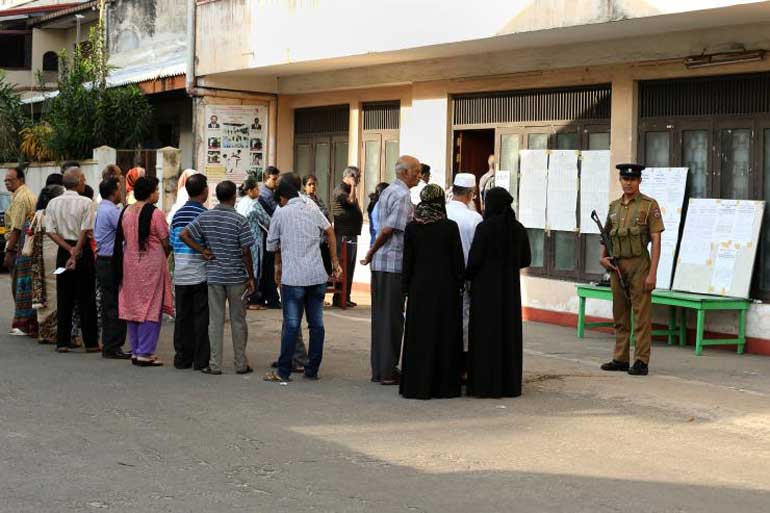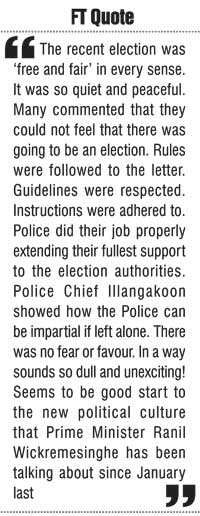Friday Feb 13, 2026
Friday Feb 13, 2026
Saturday, 22 August 2015 00:00 - - {{hitsCtrl.values.hits}}

People lining up to vote at the general election
It was 20 July 1960. A Parliamentary election was being held following the defeat of the UNP Government which had been elected just four months earlier.
I was attached to the ‘Dinamina’ news desk and covering Parliament was one of my tasks. On election day my Managing Editor, M.A. de Silva (he was Lobby Correspondent/Political Editor for the Daly News prior to moving on to the ‘Dinamina’) suggested doing a quick tour to see how the election was going.
We set off and covering a few electorates stopped at the Ambepussa rest house for lunch. As we stepped in, whom do we meet? Prime Minister Dudley Senanayake, all by himself, had come there to have lunch while going round his electorate, Dedigama.
In his familiar casual attire – bush shirt and trousers – he had driven the car himself. There were no security guards around him nor was there a Police patrol car. The Prime Minister could drive around on an election day. How peaceful things were!
Having known him quite well, MA de S had a brief chat and asked what he thought about the election.
“We will romp home,” was his reply. 
When the results were announced, it was not so. The SLFP led by Sirimavo Bandaranaike had won. Anyway, that’s another story.
I am only trying to comment on how things were then and now. There was always rivalry among political parties and candidates during election campaigning. But hardly any incidents were reported. Unlike today there were no NGOs monitoring elections. Nor were foreign observers coming on the invitation of the government to see how the election was going.
The media, limited to press and radio, carried on regardless. There was no need for the Elections Commissioner to intervene or issue guidelines as to how the media should behave.
I got to know the then Commissioner, E.F. Dias Abeysinghe, whom I met regularly to get news. He never called a press conference. There was no need. Everything was flowing smoothly. And he had had to organise and conduct two elections within four months – March and July 1960. He did an excellent job and both were peaceful.
Using public property for election purposes by the governing party was not an issue. Hardly anybody commented on public property being used for election purposes. The public servants did their duty but never openly canvassed for a particular party, nor did they participate in political meetings. Not openly anyway. 
At a by-election for the Avissawella seat during the State Council days, my father who was head master of Hanwella Bilingual School told my mother not to have any coloured curtains in the official bungalow we were occupying. Those were the days when colours were used to identify candidates and the voter only had to drop the ballot paper into the coloured box of his choice. My father went to that extent to be neutral and impartial as a government servant. Though I was quite small it’s something that I remember very well.
The first few general elections under the Parliamentary system were quite peaceful and conducted as clean contests. Things changed as years passed and after 1970s thuggery and violence was the order of the day. I recollect how in my hometown just beyond Gampaha, candidate Reggie Ranatunga’s house was burnt by the opponent’s thugs after the election. The family had to run away and hide to save their lives.
We are well aware of how elections were conducted in more recent times. Rules were flouted. Guidelines were not adhered to. Instructions by election authorities were ignored. Thuggery and violence ruled the day.
In that context the recent election was ‘free and fair’ in every sense. It was so quiet and peaceful. Many commented that they could not feel that there was going to be an election. Rules were followed to the letter. Guidelines were respected. Instructions were adhered to.
Police did their job properly extending their fullest support to the election authorities. Police Chief Illangakoon showed how the Police can be impartial if left alone.
There was no fear or favour. In a way sounds so dull and unexciting! Seems to be good start to the new political culture that Prime Minister Ranil Wickremesinghe has been talking about since January last.
All this because of one man doing his job properly. Kudos to the Commissioner of Elections Mahinda Deshapriya whom the websites fondly referred to as ‘Maco’ – ‘Mathivarana Comasaris’. Well done, Sir!